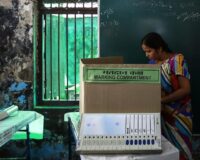State led initiatives
- The Prime Minister said that the participation of the unorganised sector is very important to the development of the country. He also mentioned several steps taken by the government like the One Nation One Ration Card scheme, micro loans facility under the Pradhan Mantri Svanidhi Yojana for street vendors among other schemes for the benefit of the workers.
- The Union Labour Minister announced that, in the last six months, over 27 crore registrations have been made under e-shram in the unorganised sector, which employs over 90% of the workforce.
- The ruling party, BJP celebrated the ‘Samajik Nyay Pakhwada’ (Fortnight dedicated to social justice) with leaders from the party highlighting the government’s specific welfare measures on each of the days.
Labour legislations & Social security measures
- Opposition members condemned the government for not organising the Indian Labour Conference, the apex level consultative committee in the Ministry of Labour and Employment since 2015. The Indian Labour Conference is an apex level tripartite consultative committee in the Ministry of Labour and Employment consisting of all central trade unions, employer’s organisations, concerned state and UT ministries and departments. The ILC deliberates on the issues concerning the welfare of workers. Some of its notable contributions include building consensus for standing orders for employment (1945) and fixing the methodology to calculate minimum wages (1957).
- The opposition criticised the government for not taking steps to curb the rising unemployment and job losses accusing it of framing policies to help corporates and for dealing a blow to the rights and interests of the working masses. They also argued that the government did not consult trade unions before formulating the Labour Codes as previous governments have done before introducing the 44 labour laws which are set to be subsumed, modified or retained as per the new codes.
- At the Federation of PTI Employees union meeting, the Union Labour Minister Bhupender Yadav said that the Labour Codes are in consonance with the ILO norms and have been notified keeping in mind social security, safety, occupational hazards and welfare of the workers of all sectors.
- The Labour Codes might, however, not be introduced before June end because all the state governments have not framed rules for them. 23 states have framed rules for the Labour Codes and seven states are yet to frame them.
- The Tamil Nadu government published the draft rules on the Industrial Relations Code on April 11th. These will supersede the Tamil Nadu Trade Unions Regulations Act, Tamil Nadu Industrial Employment Rules and the Tamil Nadu Industrial Disputes Rules after the Codes and the final Rules are notified.
Notes from the field of work
- The Unorganised Workers Federation National coordinator Geetha Ramakrishnan during a demonstration demanded that the welfare boards in the state be protected and not done away with with the introduction of the Labour Codes as states are required to frame new rules as per the Labour Codes. The National Coordinator for the federation said that the “state is one of the pioneers in operating a welfare board to effectively safeguard social security of labourers” These welfare boards have been set up under State laws for different groups of unorganised workers including transgender persons, manual scavengers, journalists among other workers. They provide seek crucial social security schemes and benefits.
- According to CMIE data, out of India’s 90 crore working population, only 36 crore people are currently looking for employment. Labour force participation has declined from 46% to 40% in five years. More than 50% of the 90 crores Indians of legal working age, particularly women, don’t want a job due to increasing frustration of not finding the right kind of employment according to a report by the Centre for Monitoring Indian Economy. In the last 5 years, about 2 crore women have disappeared from the workforce. There was also a decline in number of women looking for jobs in 2021. The number declined from 95 lakhs in 2019 to 83 lakhs in 2020 and only 6.52 million in 2021, which has been observed in both rural and urban India.
- A falling Labour Force Participation Rate with special reference to the participation of women indicates that out of the working-age population, a very large chunk is unable to seek employment. It is also possible that the available jobs are also low-paying and do not attract many youth who are entering the labour market. It also indicates that the closure of several micro and small enterprises like tailoring shops and beauty salons after two years of Covid 19 pandemic has pushed a large number of people out of the workforce. The low presence of women also indicates that there are not enough employment opportunities for women pushing them into occupations considered voluntary work or freelance work like those in platform work companies. Lack of structural support in the form of structural support, access to higher education are some of the reasons for lower female labour force participation as well.
- The Supreme Court judge Justice DY Chandrachud said that there is an urgent need for legal measures to improve the conditions of app-based workers. Speaking at the Justice PM Mukhi Memorial lecture on the topic “Reconciling Rights and Innovation”, he said that the laws must evolve to address the privacy concerns of the people as well.
Worker Resistance
- On Apr 1, 2022, the Amazon Labour Union and the Starbucks Workers United in America went to elections at their respective workplaces in Staten Island, New York and Buffalo, New York and won significant victories sparking widespread praise for their efforts to organise at the workplace. Both the campaigns have been led by determined workers who are inspired by the Bernie Sanders campaign and the Black Lives Matter movement. The campaigns have evolved in a significant degree of self-organisation which have emerged in the pandemic induced workplace struggles for workers. Workers at 100 US based Amazon facilities have planned to unionise at their workplaces.
- Even after Uber announced a 12% price hike in Delhi NCR to accommodate the rise in petrol prices and diesel prices, Delhi’s Uber and Ola drivers went on strike for 3 days demanding subsidy on CNG and revision of fares. The strike was postponed after the Transport Minister assured the striking workers that their demands would be considered.
-Written by T. Lalita, who currently interns at Aajeevika Bureau‘s Bangalore office and edited by Kavya Bharadkar and Divya Varma from Aajeevika Bureau






